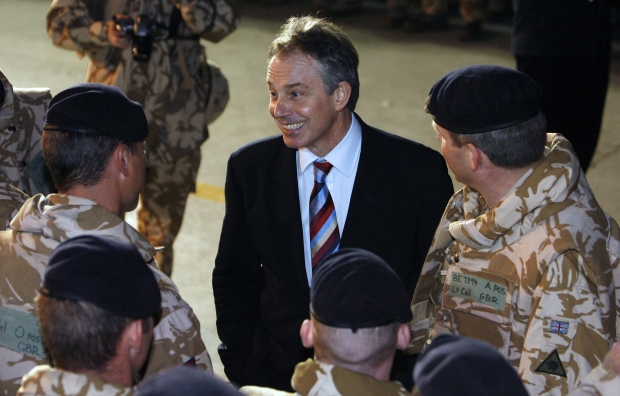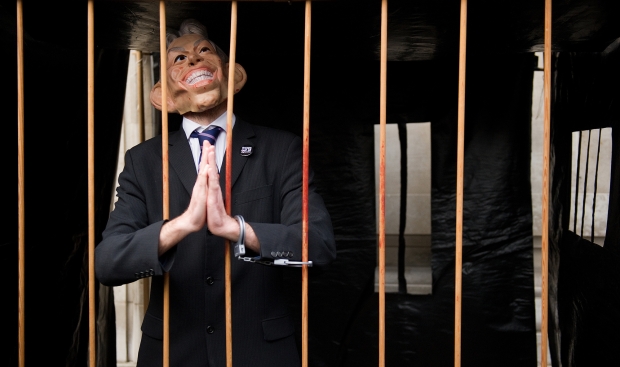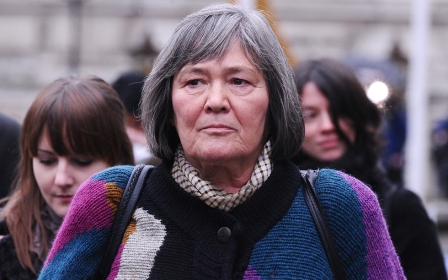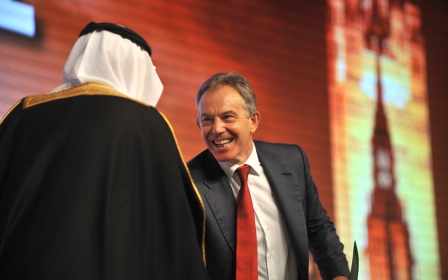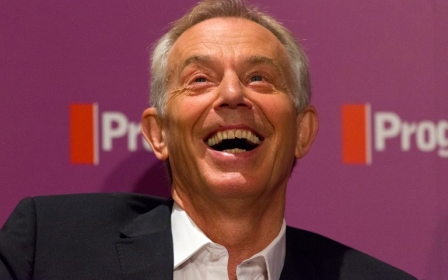Sorry not sorry: Tony Blair in his own words on Iraq
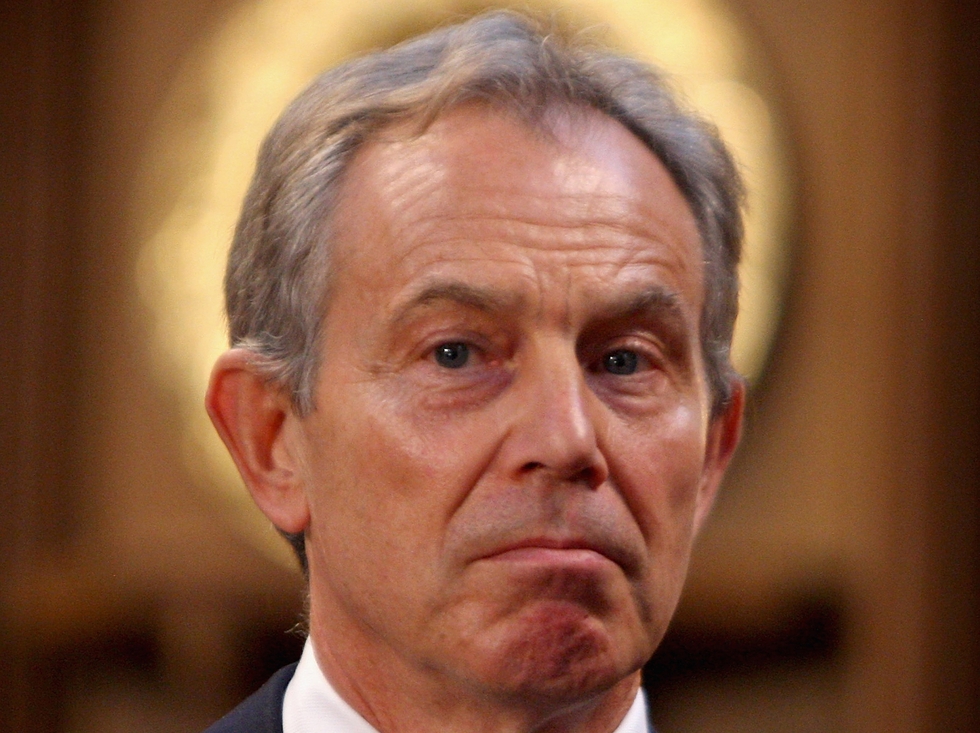
Tony Blair is expected to come out fighting after the long-awaited Chilcot report and defend his decision to join in the invasion of Iraq in 2003.
According to widespread press reports the former British prime minister will call on his critics to ask themselves what the Middle East would look like today with Saddam Hussein still in power, and capable of developing weapons of mass destruction.
He will also try and argue that the ultimate cause of long-term bloodshed in Iraq was the scale of the intervention in the country by Iran and al-Qaeda, rather than any failures in planning by British politicians and military leaders.
His supporters say he is “entitled to defend himself” when accused of being war criminal, but with the long-awaited Chilcot report due to be published within days, attention has focused on Blair’s journey from cheerleading for war to a series of non-apologies.
Here is a rundown of Blair's statements in the run up to, and the aftermath of, his decision to invade Iraq.
The march to war
September 2002: Blair makes the claims to MPs that British intelligence: “concludes that Iraq has chemical and biological weapons, that Saddam has continued to produce them, that he has existing and active military plans for the use of chemical and biological weapons, which could be activated within 45 minutes”.
March 2003: On the eve of war, Blair tells MPs at a crunch House of Commons vote that: “This is not the time to falter. This is the time for this House to give a lead.”
June: Nearly three months after the invasion, no weapons of mass destruction have been found despite extensive searches by US and British troops. Despite this Blair said he had “no doubt” that inspectors would “find the clearest possible evidence of Saddam's weapons of mass destruction“.
July: Under mounting pressure as searches in Iraq continue to come up empty-handed, Blair tells the Commons: “I don’t concede it at all that the intelligence at the time was wrong.” In the same month President George W Bush declared that American troops would remain in Iraq, challenging the insurgents to bring the fight to US marines and soldiers. He said: “My answer is, bring ‘em on.”
January 2004: By early 2004, as a suicide bomber killed more than 60 Iraqis outside the headquarters of the US-led coalition, Blair shows his first real doubts over the conflict in an interview with BBC Breakfast with Frost. Asked whether he was wrong about the existence of WMD, he said: “I don't know. The chief of defence staff and other people were saying, 'Well, we think we might have potential WMD finds here or there'. Now these things didn’t actually come to anything in the end.”
Dropping the bomb
July: More than a year after the invasion Blair told the Commons that WMD “could have been hidden”. Later that month he changed his stance, telling the Butler inquiry into the invasion that it was “increasingly clear” that Saddam “did not have stockpiles of chemical or biological weapons ready to deploy”.
September: The Labour Party conference in 2004 brought a major change in direction when Blair said regime change alone was a worthy justification for the war. He said: “I can apologise for the information being wrong but I can never apologise, sincerely at least, for removing Saddam. The world is a better place with Saddam in prison not in power.”
March 2006: Blair sounds the death knell for WMDs as he claims the invasion was part of a wider global struggle between “democracy and violence”. In the major foreign policy speech he did not mention WMDs, but said: “This is not a clash between civilisations. It is a clash about civilisation.” Meanwhile President George Bush said of Iraq’s WMD programme: “There’s an old saying in Tennessee - I know it’s in Texas, probably in Tennessee - that says, fool me once, shame on, shame on you. Fool me - you can’t get fooled again.”
December 2009: In an interview with Fern Britton for the BBC, Blair admitted that a lack of WMDs would not have stopped the invasion. He said: “I would still have thought it right to remove him. I mean obviously you would have to use and deploy different argument about the nature of the threat.”
No regrets to deep regrets
January 2010: As he was barracked by a member of the public, Blair tells the Chilcot inquiry that he has “no regrets” about removing Saddam. In a robust defence of his decision to go to war he labelled Saddam a “monster” who “threatened not just the region but the world.” He said Iraqis were now better off and he would take the same decisions again.
January 2011: Blair finally said he “regrets deeply and profoundly the loss of life” caused by the invasion of Iraq. Speaking at his second appearance at the Chilcot Inquiry he said his earlier refusal to express regret for the conflict had been misinterpreted. His words were met with cries of “too late” from the public gallery.
February 2013: Nearly 10 years after the invasion of Iraq the former UK prime minister told BBC Newsnight that life in Iraq was not what he had hoped it would be when he opted to invade. He said he thought about those who died and the consequences for their families, but added that “in the end you are elected prime minister to make these decisions.”
March: On the 10th anniversary of the invasion he said that the situation in Iraq would have been “a lot worse than Syria” if the US-led invasion had not removed Saddam Hussein. He claimed that an Arab Spring-style rebellion against Saddam by Iraqis would have seen protesters “killed in very large numbers”.
June 2014: Blair rejected as “bizarre” claims the US-UK invasion of Iraq in 2003 contributed to the rise of the Islamic State group. In an essay on his website he said: “We have to liberate ourselves from the notion that we caused this.” His essay was published as IS fighters swept through towns and cities north and west of Baghdad.
The a-word
October 2015: In a major concession, apparently designed to prepare the ground of the publication of the Chilcot inquiry, Blair offered a qualified apology for the use of misleading intelligence and the failure to plan properly for the aftermath of the invasion. In an interview with CNN, the former British premier apologised for “some of the mistakes in planning”. He also said: “I apologise for the fact that the intelligence we received was wrong.” However he refused to apologise for “removing Saddam”.
May 2016: Less than two months before the publication of the Chilcot report, Blair admitted that Britain and the US had “profoundly” underestimated the chaos that would be unleashed by the toppling of Saddam Hussein, in what has been labelled his starkest expression of regret over the Iraq War. Speaking at an event hosted by Prospect magazine, the former British prime minister repeated his view that the West had not foreseen the “forces of destabilisation” in the wake of the 2003 invasion of Iraq. He said: “We underestimated profoundly the forces that were at work in the region and that would take advantage of the change once you topple the regime.”
June: Interviewed by Bloomberg News in some of his last public comment before the report’s publication, the former Prime Minister did not apologise but did turn his fire on current Labour leader Jeremy Corbyn, who has suggested Blair might be tried for war crimes. He said: “I’m accused of being a war criminal for removing Saddam Hussein, who by the way was a war criminal, and yet Jeremy is seen as a progressive icon as we stand by and watch the people of Syria barrel bombed, beaten, and starved into submission and do nothing."
Middle East Eye propose une couverture et une analyse indépendantes et incomparables du Moyen-Orient, de l’Afrique du Nord et d’autres régions du monde. Pour en savoir plus sur la reprise de ce contenu et les frais qui s’appliquent, veuillez remplir ce formulaire [en anglais]. Pour en savoir plus sur MEE, cliquez ici [en anglais].


